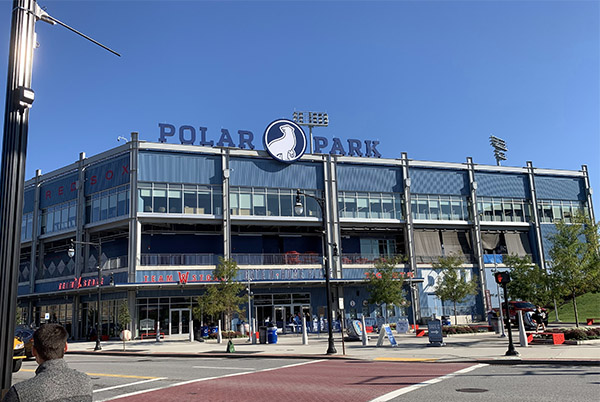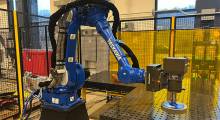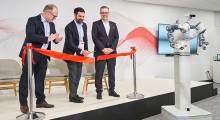WORCESTER, Mass.—If all politics is local, so too are opportunities to develop workforces and boost regional economies with robotics. The Massachusetts Technology Collaborative last week held its third annual Massachusetts Manufacturing Mash-Up at Polar Park, showcasing collaboration among business, academia, and government to innovate, educate, and grow.
About 1,500 people attended the event, 25% growth over 2022, according to the event organizers. This year's Mash-Up included the 8th Annual Manufacturing Awards Ceremony, the announcement of the Massachusetts Manufacturing Accelerate Program (MMAP) grant winner, and exhibits by technology companies, as well as student networking and challenges.
“Our organization is proud to support, help scale, and celebrate the Massachusetts manufacturing ecosystem at this incredible event, and we’re humbled by the growth over the last three years,” stated Christine Nolan, director of the Center for Advanced Manufacturing (CAM), the lead organizer for the Mash-Up.
CAM said its mission is “to foster the most complete, collaborative, and agile manufacturing ecosystem, to enable business growth from innovation through production.” It is a division of the Massachusetts Technology Collaborative (MassTech), a public agency tasked with supporting new technologies, workforce development, and a business-friendly environment in the commonwealth.
Massachusetts recognizes industry leaders
While New England was a leader in the first Industrial Revolution 200 years ago, in the past few decades, many people have viewed manufacturing as a polluting, physically exhausting, and low-advancement sector. MassTech and its partners organized the Mash-Up to highlight leadership and innovation and to show young workers worthwhile potential careers for the 21st century.
The co-chairs of Massachusetts Legislature’s Manufacturing Caucus organized the 8th Annual Manufacturing Awards Ceremony to recognize industry leaders for their contributions.
“In Massachusetts, our manufacturing sector is known for its focus on innovation and sustainability, with many companies investing in research and development to reduce waste, conserve resources, and improve energy efficiency,” said State Representative Jeffrey N. Roy (D-Franklin), House chair of the caucus. “We were proud to celebrate 68 manufacturing awardees who serve as examples of what it means to 'Make it in Massachusetts' and have helped drive manufacturing output at its highest level in history.”
“Manufacturing is a pillar of our state economy, and these grant awards will ensure this sector continues to thrive.” said State Senator Paul Feeney (D-Foxborough), co-chair of the Manufacturing Caucus.
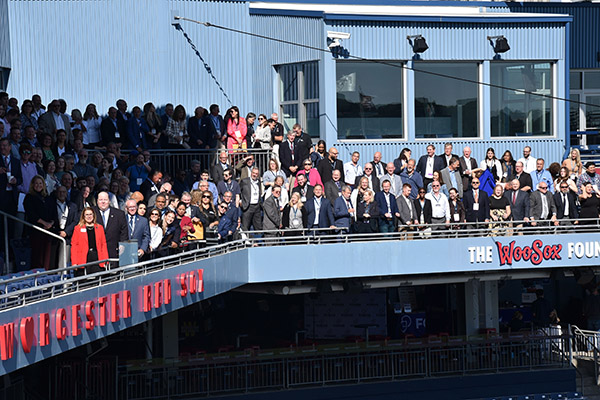
Government awards SMEs grants
At the event, the governor's office announced more than $2.2 million in grants through the MMAP to help small to midsize enterprises (SMEs) in the state scale their businesses to compete in the modern manufacturing economy.
“Massachusetts is home to a world-class manufacturing sector comprised of leading companies that are driving innovative solutions, streamlining production techniques, and building a pipeline of talented workers fueling this incredible ecosystem,” said Yvonne Hao, secretary of the Executive Office of Economic Development. “The Healey-Driscoll Administration is proud to invest in manufacturing through MassTech's MMAP grants.”
“The MMAP program provides manufacturers with the tools they need to scale, adopt new technologies, and meet customer demands worldwide,” said Sarah Stanton, undersecretary of economic strategies in the Executive Office of Economic Development. “In this era of rising global competition, it is essential that Massachusetts build a robust, diverse, and responsive manufacturing sector that supports economic opportunity in our state and the needs of our nation.”
The MMAP program said it invests in cutting-edge tools at each of the 11 grantees, while also building partnerships with key organizations within the Massachusetts manufacturing ecosystem. Each company received about $200,000.
“The MMAP grantees show that manufacturing is not relegated to one region of our state or to one type of industry, with production happening in nearly every corner of Massachusetts,” said Carolyn Kirk, executive director of MassTech. “The statewide focus, mixed with the emerging opportunities around new federal investments within this sector, make this an exciting time for manufacturing in Massachusetts.”
Federal investments in the state include $19.7 million from the federal CHIPS and Science Act, which is intended to support domestic production of microelectronics through workforce and technology development.
The fourth round of MMAP grants is now open for applications.
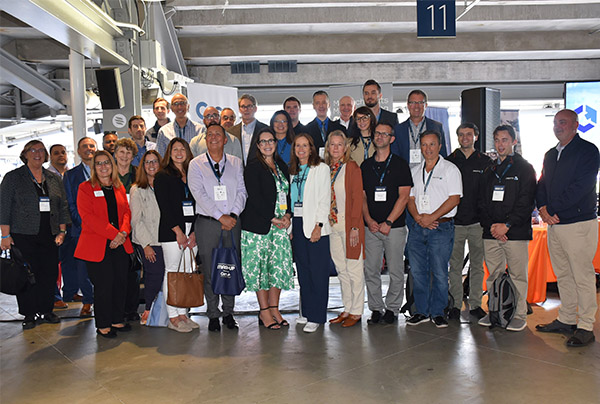
Community gathers to support industry
“In addition to the companies, students, and legislators in attendance, we want to give a big shout out to all of our sponsors and partners for contributing to the success of the Mash-Up,” Nolan said. “It's truly a team effort to pull together this event and to show-off the outstanding resources, talent, and products that Massachusetts has to offer.”
Exhibitors and sponsors of this year's Mash-Up included Teradyne (parent company of Universal Robots and Mobile Industrial Robots), the Advanced Robotics for Manufacturing (ARM) Institute, and MIT Lincoln Lab.
Other sponsors included 6K, Synagex, Quabbin Wire & Cable, Tooling U-SME, GBMP, Equinor, the Massachusetts Manufacturing Energy Collaborative, Skylitics, Hybrid CNC Parts, Spark Photonics, Mack Prototype, AB Corp, MRSI Myronic, Modern Mold and Tool, MassDevelopment, Massachusetts Life Sciences Center, and Associated Industries of Massachusetts.
Organizing partners for the event included CAM, the Massachusetts Manufacturing Extension Partnership (MassMEP), FORGE, Worcester Polytechnic Institute (WPI), MassHire, and MassRobotics.
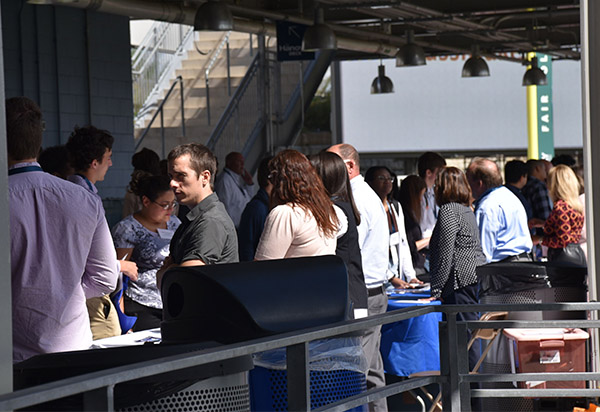
Mash-Up includes student activities
This year's Massachusetts Manufacturing Mash-Up activities included an “on-deck” STEM Challenge. It brought together 300 students from Innovation Pathways, a workforce development program that connects students with career opportunities in high-demand industries.
There was also a “speed networking” session for diverse community college students participating in the state’s MassBridge training program. They spoke with company representatives and saw exhibits of additive manufacturing, robotics, and photonics projects that promise to reshape multiple industries, from healthcare and defense to transportation.
About the Author
Follow Robotics 24/7 on Linkedin
Article topics
Email Sign Up

